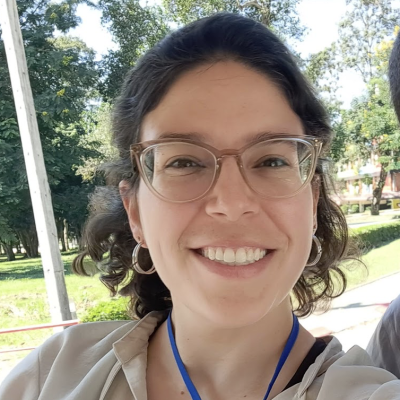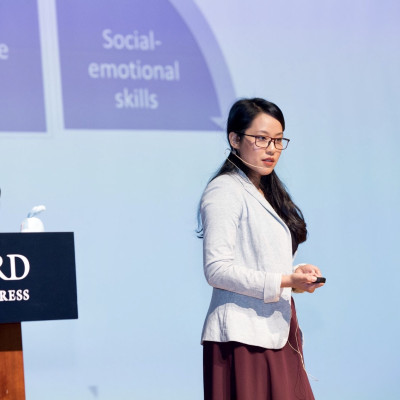Sessions / Location Name: Strategies and Attitudes
Physical Location
Location: 703
Essential Visual Attention and Discrimination Skills for Struggling Readers #4240
English is the main medium of instruction in Singapore’s preschools. However, many young children with learning needs often face challenges in learning to read, write and spell. Despite attending regular preschool and English enrichment classes, these children often exhibit avoidance, inattention, and anxiety during reading activities both at school and home.
Possible variables affecting these struggles include inappropriate reading materials, anxiety, poor visual attention to print, weak working memory and vocabulary, low motivation, limited exposure to books, and English not being their first language.
This workshop will focus on how to support these children in engaging with print. It will highlight the application of an eclectic approach that emphasizes positive engagement, visual discrimination skills, visual memory, and motivation. It will demonstrate appropriate reading strategies to help their foundational reading skills. It will also present the use of developed physical and digital materials to engage them to reading.
Page-Turner Practices: Practical, Captivating Approaches to Engage Readers #4395
We will show how Xreading and reading clubs have benefited students and how diversifying activities lead to student engagement and material retention. We will then break out into four small groups, each led by a co-presenter, to share activities involving different life skills and subjects. Attendees will rotate through each fifteen-minute station. In one group, participants work together to answer trivia questions to solve a letter cipher and decode story titles. They will then match the titles and characters descriptions to the correct stories. In another group, participants will read a short story and then the reading will disappear. Exercising their reading comprehension and imagination, the participants will recall and draw a specific character from the reading. Afterwards, presenters and participants will discuss the workshop activities; how they can be implemented in different classrooms and with different leveled students.
The Big ER Debate: "Evaluating extensive reading ruins the joy of reading" #4133
Two teams will debate a controversial topic in the field of Extensive Reading. Reading is its own reward. Or is it? Find out here.
Writing Skills and Vocabulary Gains through ER in a Teacher Training Course #4135
Students enrolled in the second year of an elementary school teacher training course read extensively over a three-month period (once a week for 45 minutes x 9). The results of an English writing test (fluency, syntactic complexity, syntactic accuracy, lexical complexity) and a vocabulary survey (150 questions in total, 30 each at the 1000-, 2000-, 3000-, 4000-, and 5000-word levels) conducted before and after the extensive reading program showed no significant growth in writing skills, but significant growth in vocabulary was observed at the 1000-word level, the 4000-word level, and in total. The reflections written by the participants after the 3rd, 6th, and 9th lessons were analyzed qualitatively, and the factors behind the quantitative results were analyzed and implications will be discussed based on these results.
Extensive and Blended Reading: A Comparison for Korean Engineering Students #4143
This study examined the effectiveness of different English reading instruction approaches at two Korean engineering universities. At University A (U-A), students engaged in extensive reading (ER) using English novels exclusively, while University B (U-B) employed a blended approach combining intensive reading (IR) of EFL textbook passages with ER assignments. The study involved 167 participants using pre- and post-tests. At U-A, intermediate-level students showed significant improvement in reading comprehension, whereas advanced-level students made modest gains. At U-B, advanced-level students experienced substantial improvement. Survey results indicated that students at both universities viewed English novel reading positively. However, U-B students preferred TOEFL-style reading, while U-A students favored peer discussions about novels. The findings suggest that the blended approach offers measurable advantages in test performance due to its alignment with TOEFL’s emphasis on detailed comprehension, while ER provides motivational and developmental benefits, indicating that a balanced mix of ER and IR may optimize curricula.
中国广泛阅读实践与案例分享交流 (PERC交流会) #4471
1. PERC:英语广泛阅读的发展和市场变化 2. 一线老师关于泛读实践的案例分享 3. 讨论交流
Optimum Readability Levels for Japanese Elementary-level EFL Learners #4387
The author analyzed the reading histories of 42 students in an ER program in Japan. They joined the program at 15 years old and read a million words or more of English texts for five to seven years. They were divided into three groups depending on their TOEIC score increase rate: 57, 121, and 187 points per million words on average. Their readability levels (Yomiyasusa-level: YL) and the total words read were analyzed. The lowest score-increase group had read 2.2 million total words and was reading the texts of YL 3.2 on average. In comparison, the highest score-increase group had read ‘fewer’ 1.2 total words and was reading ‘easier-to-read’ text of YL 2.1 when they both scored TOEIC 500. The result suggests that the optimum readability levels for Japanese elementary-level EFL learners are around YL 2.5 or even lower when their TOEIC scores are 500.
International Students' Reactions to Extensive Reading at a Japanese University #4141
As the population of 18-year-olds declines in Japan, the number of international students has increased in recent years. This presentation focuses on the impact of ER on international students enrolled in a range of EFL courses at a Japanese university from 2020 to 2024. Sixty-four students from 10 countries participated in 17 classes with Japanese peers. Since 2020, X-Reading has been used online in ER classes, while paper books in others. The reading target varies by class (native books for a fluent student). The presenter will show the reading amount, the series and tasks/activities they liked, and the results of the C-Test. She will include the data on their educational backgrounds and motives for taking English classes. The results from the comprehensive class survey have provided positive support for implementing ER linguistically and/or affectively. Overall, ER conducted in a globalized learning environment created synergy for the international and Japanese students.















